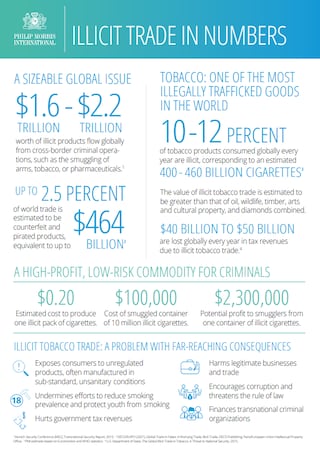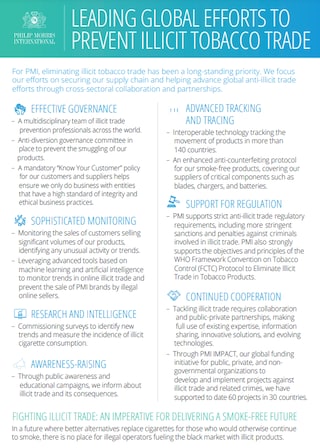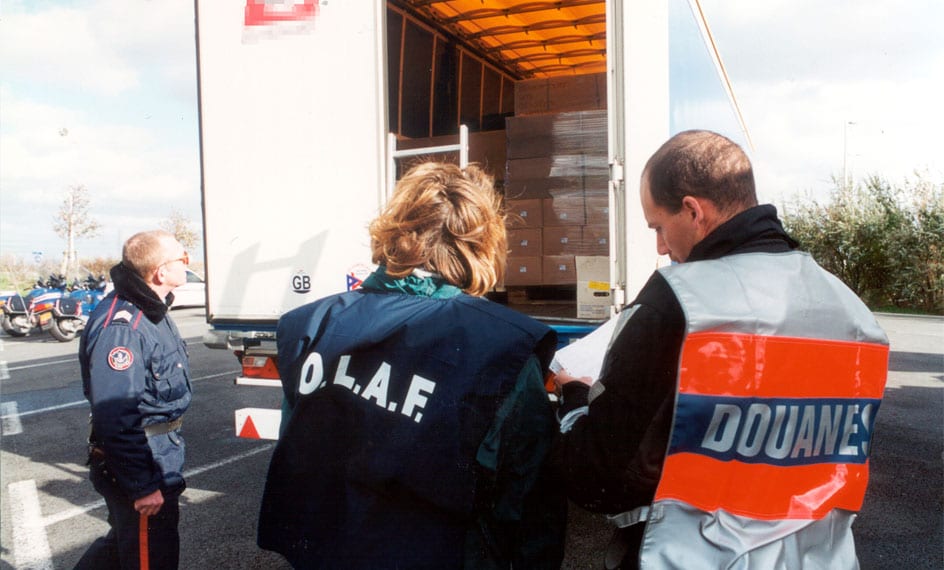Illicit trade is a serious and growing threat to society. Governments are losing billions in tax revenues, legitimate businesses are being undermined, and consumers are being exposed to poorly made and unregulated products. The World Economic Forum has warned that illicit trade can create an annual drain on the global economy of USD 2.2 trillion.
Anything in high demand is attractive to counterfeiters and smugglers, from luxury goods to medicines, cosmetics, toys, and electronics. Cigarettes, for instance, are among the most illegally trafficked goods in the world due to the high profits and often minimal risks. Criminal networks frequently use these profits to fund other activities such as human trafficking, drug trafficking, and even terrorism.
Illicit trade makes cheap, unregulated, or non-compliant tobacco products easily accessible—undermining efforts to reduce smoking prevalence and protect young people from smoking. Therefore, preventing illicit trade is central to many public health policies around the world. To succeed in our mission of delivering a smoke-free future, we must ensure that there are no illegal actors sustaining a black market for cigarettes and other tobacco products.
What’s the impact of illicit trade?
Among its many destructive consequences, the illicit trade in tobacco products:
- Deprives governments of tax revenues
- Exposes consumers to unregulated products often manufactured in unsanitary conditions
- Poses a security threat by providing a major source of income for transnational criminal organizations
- Encourages corruption and threatens the rule of law
- Reduces the effectiveness of public health policies designed to discourage smoking, with unregulated, substandard quality and non-compliant products
- Makes it easier for minors to access tobacco products
- Undermines the legitimate industry’s business
How big is the problem of illicit trade?
A Munich Security Conference (MSC) report states that global illicit flows reach between USD 1.6 and 2.2 trillion annually. A significant portion is the trafficking of counterfeit and pirated goods, which a 2021 OECD study estimates may have reached USD 464 billion in 2019—that’s 2.5 percent of world trade.
Around 12 percent of total cigarette sales (excluding China) are sourced from the black market. PMI estimates that between 400-460 billion illicit cigarettes are consumed globally every year.
What are the drivers of the illicit tobacco trade?
This is neither a petty nor victimless crime—the illicit tobacco trade is a source of funding for criminal networks. Among the factors contributing to it are:
- Price disparities of legitimate products across countries—and sometimes even across states or provinces in the same country—that may encourage smuggling schemes.
- Steep and abrupt tax increases, that can inadvertently lead adult smokers to illegal cigarettes. The taxation of tobacco products generates government revenue and is an important public health policy to prevent young people from taking up smoking and to promote cessation. However, criminals may take advantage of significant tax increases by offering less expensive, unregulated, and untaxed illegal products, including counterfeits.
- Overstretched law-enforcement agencies, and inadequate penalties for smuggling cigarettes and other tobacco products.
The banning of tobacco products or smoke-free and novel products, such as e-cigarettes and heated tobacco products, could also help grow illicit markets. According to a report by the Global Initiative Against Transnational Organized Crime (GI-TOC), South Africa’s outlawing of the domestic trade in tobacco products in March 2020 made the illegal trade of tobacco products “even more profitable.” It also found that it “undermined the country’s revenue-generation abilities while also failing to deliver public health benefits.”
How do you combat illicit trade?
- Understand the scope of the problem
This is key if we want anti-illicit trade strategies and solutions to remain relevant and effective. We must research the scale, drivers, and trends in the illicit tobacco trade. - Enable consumer awareness and education
We want to help consumers identify the difference between legal and illegal products, as well as the risks involved in purchasing illegal cigarettes, e-cigarettes, and heated tobacco products. - Call for tough penalties and strong enforcement
Governments should implement laws to criminalize the illicit trade in tobacco products. This should be backed up with adequate enforcement and the strict application of meaningful penalties. This should include zero-tolerance for anyone in possession of contraband or counterfeit tobacco products. - Seize and destroy
Seized products and manufacturing machinery should be routinely destroyed, and the assets of convicted tobacco traffickers should be forfeited. - Enhance supply chain controls
Technological innovation can give governments, retailers, and consumers the ability to rapidly determine whether a product is genuine or fake. Tracking and tracing solutions can help address smuggling of products across borders. Security features can help authenticate products and address counterfeiting issues. - Foster public-private partnerships
Coordinated and committed action by local and international public and private sectors on a continuous basis is vital.
How can law-enforcement agencies combat illicit trade?
We need partners in government and law enforcement, and believe efforts to combat illicit trade will be most successful if they are focused on:
- Well-funded and fully staffed law-enforcement agencies, with a clear mandate to act against illicit tobacco trade
- Transnational legal tools and mechanisms ensuring effective exchange of information between national law-enforcement agencies and judicial authorities to investigate, punish, and deter cross-border trafficking
- Clear ethics policies and fair compensation for law-enforcement agencies to overcome corruption
- Funding intelligence efforts, enabling law-enforcement agencies to investigate criminal networks
- Legislation, such as asset-forfeiture laws and criminal penalties that deter illicit tobacco traders
How can effective regulation combat illicit trade?
Governments have a key role to play in ensuring more effective enforcement of laws and penalties. Therefore, we strongly support the objectives and principles of the WHO Framework Convention on Tobacco Control (FCTC) Protocol to Eliminate Illicit Trade in Tobacco Products, including:
- Product tracking and tracing based on cost-effective digital solutions, as well as open and recognized international standards
- Effective control and monitoring of free-trade zones
- Enhanced international cooperation
- Application of sanctions to deter illicit traders
- Licensing regimes that focus on tackling illicit trade
- Meaningful due diligence and record-keeping requirements
PMI stands ready to work with regulators and policymakers to enact positive change on society, by advancing efforts to prevent illicit trade from occurring.
What is PMI doing to combat illicit trade?
In a future where those who would otherwise continue to smoke have replaced cigarettes with better alternatives, there is no place for illegal operators fueling the black market with illicit tobacco products.
This is why tackling illicit trade is one of our top priorities. We are fully committed to controlling our own supply chain, and we dedicate significant resources to fighting the illegal tobacco trade. We support and help law-enforcement agencies by inspecting and authenticating seized products, and performing forensic evaluations. We also profile illicit products, share intelligence on emerging routes and trends shaping the black market, and train officials on the innovative authentication and security features we use to protect our products.
“As private sector representatives and members of civil society, we know how crucial it is to protect trademarks and consumers from smugglers and counterfeiters. It is paramount that consumers learn about the dangers and real-life consequences behind illicit tobacco products—which are completely unregulated and don’t comply with basic safety and quality standards.”
What is “diversion” and how can it be prevented?
Diversion refers to the movement of genuine products into an unintended market by an unauthorized seller or re-seller in violation of tax laws, customs and border controls, sales bans, or restrictions. Fighting against the diversion of our tobacco and novel products is a key component of our sustainability program. Over the years, our supply chain controls have been improved through our cooperation with regulators and other governmental agencies with whom we have specific commitments and obligations.
We set high standards for ourselves and for the organizations we work with. In this regard, we:
- Apply “Know Your Customer” and “Know Your Vendor” requirements
- Have made large investments to comply with tracking and tracing requirements in all the countries where we operate and have developed other tools to effectively reduce the diversion of tobacco products from our supply chain
- Use the information gathered from seizure inspections to identify the points of diversion with the aim of preventing reoccurrence
Philip Morris International—leading the charge to eradicate illegal trade
For PMI, preventing illicit trade has been a longstanding priority and continues to be an integral part of our efforts to drive operational excellence and build a sustainable future.
To unsmoke the world and enable millions of adults who would otherwise continue smoking cigarettes to change to better alternatives, it’s essential to eliminate illicit tobacco trade wherever it exists.
There’s simply no place for illegal actors in a smoke-free future.
Top photo © Getty Images






